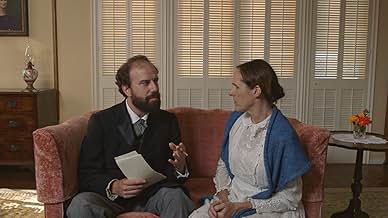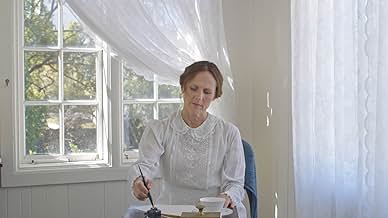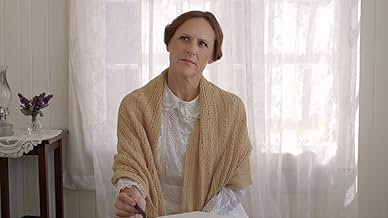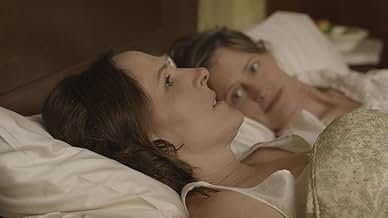IMDb रेटिंग
6.2/10
1.5 हज़ार
आपकी रेटिंग
अपनी भाषा में प्लॉट जोड़ेंDramatization of the little known side of the writer Emily Dickinson's life, in particular, her relationship with another woman.Dramatization of the little known side of the writer Emily Dickinson's life, in particular, her relationship with another woman.Dramatization of the little known side of the writer Emily Dickinson's life, in particular, her relationship with another woman.
- पुरस्कार
- 3 जीत और कुल 7 नामांकन
Stella Chesnut
- Mattie Dickinson
- (as Stella Chestnut)
John Peña Griswold
- Young Austin
- (as John Griswold)
फ़ीचर्ड समीक्षाएं
This film by Madeline Olken is abit of satire on real life events. Poet, Dickinson was said to have bisexuality as a theme in her poetry. The film delves into her lifestyle within a conservative environment, whilst trying to have a love relationship with her sister-in-law, Susan Dickinson.
This film does well with satire in depicting Dickinson's life. The pace of the film works with the witty humor personified by Molly Shannon's portrayal of the poet. Behind the burgeoning setting, it explores Dickinson as poet trying to assert her writing to a male dominated literary scene.
The film brings light to Dickinson's poetry, which seemed always tragic, misunderstood but questions one's existence. It follows a young relationship between two young women until the death of Dickinson, with devoted caring from Susan.
Although this film has a humorous tone, it takes seriously in how women writers weren't taken seriously or equal to era-related white male authors. The film trys to break down via satire, the mythology that lies behind Dickinson's lifework.
This film does well with satire in depicting Dickinson's life. The pace of the film works with the witty humor personified by Molly Shannon's portrayal of the poet. Behind the burgeoning setting, it explores Dickinson as poet trying to assert her writing to a male dominated literary scene.
The film brings light to Dickinson's poetry, which seemed always tragic, misunderstood but questions one's existence. It follows a young relationship between two young women until the death of Dickinson, with devoted caring from Susan.
Although this film has a humorous tone, it takes seriously in how women writers weren't taken seriously or equal to era-related white male authors. The film trys to break down via satire, the mythology that lies behind Dickinson's lifework.
Starring... molly shannon, susan ziegler as emily dickinson and susan gilbert. Beautiful poetry, written as sonnets to "someone", with the name removed at some point. This version of dickinson's life and loves is much more blatant, with kissing and physical closeness occurring on camera. And a brief appearance by "kate", who stays with emily, making susan jealous. Although the character of kate doesn't appear in davies' film quiet passion. Susan would later marry emily's brother austin, ostensibly so they could be close. Cards at the end tell us that susan's daughter would write a book, confirming the truths and loves of emily's dickinson. Written and directed by madeleine olnek. This seems to have started as a play, performed in several houses around the country, according to wikipedia. It's well done, although a little confusing, with the frequent shifting back and forth in time. Mostly good!
On the positive side, there was some interesting information about Dickenson's poetry being "cleaned up" after her death, to blot out things that might suggest "Unnatural Passions". And the secondary leads, Amy Ziegler as the beloved sister in law Susan and Amy Seimetz as the scheming Mabel, were very well acted and created three dimensional characters.
On the negative side, this simply did not work at all as a movie. Going from a play to a movie is often difficult -- think how many times the late great Robert Altman tried it and consistently failed. The characters were inconsistent; the dialog was often stilted and unnatural; the attempts to liven up the poems were appalling. The humor was all over the place, and even when the humor was successfully funny, it seemed out of place.
Molly Shannon as Emily did best when doing funny non-reactions to the universally buffoonish men in the movie. For most other emotions, she did not get them across to me, I'm sorry to say, since I've liked her in the past, as in 'Year of the Dog'.
I wish I had liked it better, but instead I kept wishing it would just end.
On the negative side, this simply did not work at all as a movie. Going from a play to a movie is often difficult -- think how many times the late great Robert Altman tried it and consistently failed. The characters were inconsistent; the dialog was often stilted and unnatural; the attempts to liven up the poems were appalling. The humor was all over the place, and even when the humor was successfully funny, it seemed out of place.
Molly Shannon as Emily did best when doing funny non-reactions to the universally buffoonish men in the movie. For most other emotions, she did not get them across to me, I'm sorry to say, since I've liked her in the past, as in 'Year of the Dog'.
I wish I had liked it better, but instead I kept wishing it would just end.
"Wild Nights with Emily" is a biopic of the poet Emily Dickinson, based around what might be called a revisionist account of her life. The film starts from the assumption that traditional literary scholarship has tended to portray Dickinson, wrongly, as a shy, reclusive, virginal spinster whose poems were inspired by unrequited love for men. Its express purpose seems to be to correct this mistaken impression, showing her as a woman who enjoyed many friendships with other women and who had a long-lasting lesbian relationship with her friend Susan Gilbert.
According to this thesis Susan also became her sister-in-law, entering into a lavender marriage with Emily's brother Austin in order to have closer and easier access to Emily herself. (Austin and Susan had children together, so perhaps their marriage might not have been as lavender as the film makes out). The idea of Emily as a shy virgin apparently originated with her first editor, Mabel Todd, who also happened to be Austin Dickinson's mistress, and who after Emily's death expunged all mention of other women- especially Susan- from her work. Mabel's motive was partly to make the poems less shocking, and therefore more saleable in the puritanical climate of late nineteenth-century America, but she may also have been motivated by a dislike of Susan, her rival for Austin's love.
I decided to watch the film when it recently turned up on British television, but unfortunately it does not work very well as a biography. The action tends to jump about between three periods- 1840, when Emily, here portrayed as a beautiful teenager, is falling in love with Susan, the early 1860s, when she is starting to develop as a poet, and the 1890s, after Emily's death when Mabel is campaigning to establish her reputation as a major literary figure. The abrupt switches from one period to another could make the action difficult to follow at times. The timeline does not always accord with the facts of Dickinson's life; in 1840 she would still have been a young child, and in the middle period, when she would only have been in her early thirties, she is portrayed as a rather plain middle-aged woman. I felt that Molly Shannon, 54 at the time, was miscast in the leading role which should have gone to a younger actress.
"Wild Nights with Emily" is the sort of title which you might associate with softcore porn, but the film is not actually pornographic; the nature of the relationship between Emily and Susan is made clear, but there are no explicit sex scenes. The jokiness of the title is not, however, inappropriate, because the film is in many ways a comedy, treating much of Dickinson's life-story in a light-hearted way, even though, from what I have read of her poetry, she seems to have been a rather serious-minded individual. The male characters, in particular are treated as figures of fun, especially an elderly judge who treats us to a summary of that well-known Bronte sisters novel "Wuthering Jane". (He has confused the plot of "Wuthering Heights" with that of "Jane Eyre"). Emily's mentor Thomas Wentworth Higginson, in real life a noted advocate of the rights of women, is here portrayed as comically sexist, treating Emily with patronising condescension.
The film-makers do just enough to persuade me that Emily Dickinson's life, and her relationship with Susan Gilbert, could have been the subject of an interesting film. Unfortunately, what they have made isn't that film. Director Madeleine Olnek said that it was important to include comedy because "some people don't like to be lectured about feminism". She ought to realise that taking your subject-matter seriously is not the same as lecturing people. 4/10.
According to this thesis Susan also became her sister-in-law, entering into a lavender marriage with Emily's brother Austin in order to have closer and easier access to Emily herself. (Austin and Susan had children together, so perhaps their marriage might not have been as lavender as the film makes out). The idea of Emily as a shy virgin apparently originated with her first editor, Mabel Todd, who also happened to be Austin Dickinson's mistress, and who after Emily's death expunged all mention of other women- especially Susan- from her work. Mabel's motive was partly to make the poems less shocking, and therefore more saleable in the puritanical climate of late nineteenth-century America, but she may also have been motivated by a dislike of Susan, her rival for Austin's love.
I decided to watch the film when it recently turned up on British television, but unfortunately it does not work very well as a biography. The action tends to jump about between three periods- 1840, when Emily, here portrayed as a beautiful teenager, is falling in love with Susan, the early 1860s, when she is starting to develop as a poet, and the 1890s, after Emily's death when Mabel is campaigning to establish her reputation as a major literary figure. The abrupt switches from one period to another could make the action difficult to follow at times. The timeline does not always accord with the facts of Dickinson's life; in 1840 she would still have been a young child, and in the middle period, when she would only have been in her early thirties, she is portrayed as a rather plain middle-aged woman. I felt that Molly Shannon, 54 at the time, was miscast in the leading role which should have gone to a younger actress.
"Wild Nights with Emily" is the sort of title which you might associate with softcore porn, but the film is not actually pornographic; the nature of the relationship between Emily and Susan is made clear, but there are no explicit sex scenes. The jokiness of the title is not, however, inappropriate, because the film is in many ways a comedy, treating much of Dickinson's life-story in a light-hearted way, even though, from what I have read of her poetry, she seems to have been a rather serious-minded individual. The male characters, in particular are treated as figures of fun, especially an elderly judge who treats us to a summary of that well-known Bronte sisters novel "Wuthering Jane". (He has confused the plot of "Wuthering Heights" with that of "Jane Eyre"). Emily's mentor Thomas Wentworth Higginson, in real life a noted advocate of the rights of women, is here portrayed as comically sexist, treating Emily with patronising condescension.
The film-makers do just enough to persuade me that Emily Dickinson's life, and her relationship with Susan Gilbert, could have been the subject of an interesting film. Unfortunately, what they have made isn't that film. Director Madeleine Olnek said that it was important to include comedy because "some people don't like to be lectured about feminism". She ought to realise that taking your subject-matter seriously is not the same as lecturing people. 4/10.
Wild Nights With Emily (2018)
It was like an episode of 'Drunk History' (2013-9).
An awful Americanised period comedy, like a hammed up version of 'Murdoch Mysteries' (2008-) which has always been crazy cheesey anyway.
The timeline jumped all over the place and Molly Shannon showed the diversity that she has always had, that is to say, none.
It was based on the Writer/Directors one woman show and I think that there was too much comedy stage show left in it and not enough time spent converting it to a suitable format for film.
I couldn't get further than the first advert break, because it was just dull, patronising and silly all at the same time. I've seen better, more informative things from the five minute skits on 'Morecambe & Wise'. They were actually funny too!
Unscored as unfinished.
It was like an episode of 'Drunk History' (2013-9).
An awful Americanised period comedy, like a hammed up version of 'Murdoch Mysteries' (2008-) which has always been crazy cheesey anyway.
The timeline jumped all over the place and Molly Shannon showed the diversity that she has always had, that is to say, none.
It was based on the Writer/Directors one woman show and I think that there was too much comedy stage show left in it and not enough time spent converting it to a suitable format for film.
I couldn't get further than the first advert break, because it was just dull, patronising and silly all at the same time. I've seen better, more informative things from the five minute skits on 'Morecambe & Wise'. They were actually funny too!
Unscored as unfinished.
क्या आपको पता है
- ट्रिवियाOriginally performed as a play by the film's director, who extensively researched with support from Harvard University Press and the Guggenheim Foundation.
- गूफ़After Susan brings the newspaper to show Emily her published poem, she (sarcastically) wishes Emily a Happy Valentine's Day as she exits. In the next shot, a tree with full foliage can be seen out the window. There are definitely no leaves on the trees in Amherst, Massachusetts in mid-February.
- कनेक्शनFeatured in MsMojo: Top 10 Best LGBTQ+ Romantic Comedies (2021)
टॉप पसंद
रेटिंग देने के लिए साइन-इन करें और वैयक्तिकृत सुझावों के लिए वॉचलिस्ट करें
- How long is Wild Nights with Emily?Alexa द्वारा संचालित
विवरण
- रिलीज़ की तारीख़
- कंट्री ऑफ़ ओरिजिन
- आधिकारिक साइटें
- भाषा
- इस रूप में भी जाना जाता है
- 艾蜜莉夜夜
- फ़िल्माने की जगहें
- उत्पादन कंपनियां
- IMDbPro पर और कंपनी क्रेडिट देखें
बॉक्स ऑफ़िस
- US और कनाडा में सकल
- $5,19,487
- US और कनाडा में पहले सप्ताह में कुल कमाई
- $30,209
- 14 अप्रैल 2019
- दुनिया भर में सकल
- $5,23,982
- चलने की अवधि
- 1 घं 24 मि(84 min)
- रंग
- ध्वनि मिश्रण
- पक्ष अनुपात
- 1.78 : 1
इस पेज में योगदान दें
किसी बदलाव का सुझाव दें या अनुपलब्ध कॉन्टेंट जोड़ें





























